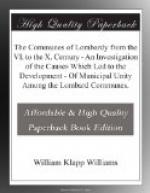As in city matters these conditions remained unaltered after the coming of the Lombards, what was more natural than that the bishops should retain their moral position of defenders of the people, even if we admit that the form of the office fell with the old administration? To these considerations we may add two important facts: that the office of bishop was for a long time the only one in the election to which the people—and by this term I mean the people as a whole, not the populus of the old laws and charters—had any voice whatever; and that the bishop, from his spiritual position as pastor of the flock, and from his civil position as having great legal influence in the town and being probably the only man of superior intellect interested in the internal affairs of the community, was the proper and most effectual mediator between the people and their temporal rulers. Hence arose that important influence of the bishops which was to have so perceptible an effect on the subsequent development of the principles of liberty in the communes.
To appreciate properly, and to give the true value to this power in its later progress, we must remember one thing: that it did not have its origin by any seeking of power by either the Roman or the Ambrosian church as a body, in any concerted effort to extend the ecclesiastical power at the expense of the civil. It came from the spontaneous effort of the pastor, the natural and at that time the only protector of the people, trying to save his flock from the extortion and the injustice of their temporal rulers. In addition to this it must be remembered that at that time the office of the bishop was the only one where even the shadow of the democratic idea was preserved, the only one where the lowest of the people, theoretically at least, had a voice in the election. In later times, when the feudal system becomes established in its completeness, the position of the bishop undergoes a great change, as his relations to the state and to society become more complex in their character; and his importance in the community, while it at first increases, in time surely diminishes, under the influence of his double relation of lord and vassal to some higher temporal power. When he in his turn becomes the possessor of political power as a great baron or as head of a civitas, his interests, and consequently his influence, are concerned with intriguing and with efforts for his own political advancement, in many cases leaving but few traces of the old relation of “defender of the people.” It is, however, of importance to note that this decline in his prominence in civil life is commensurate with the diminished need by the people of his protection, owing to the steady increase in the security and independence of their position.




